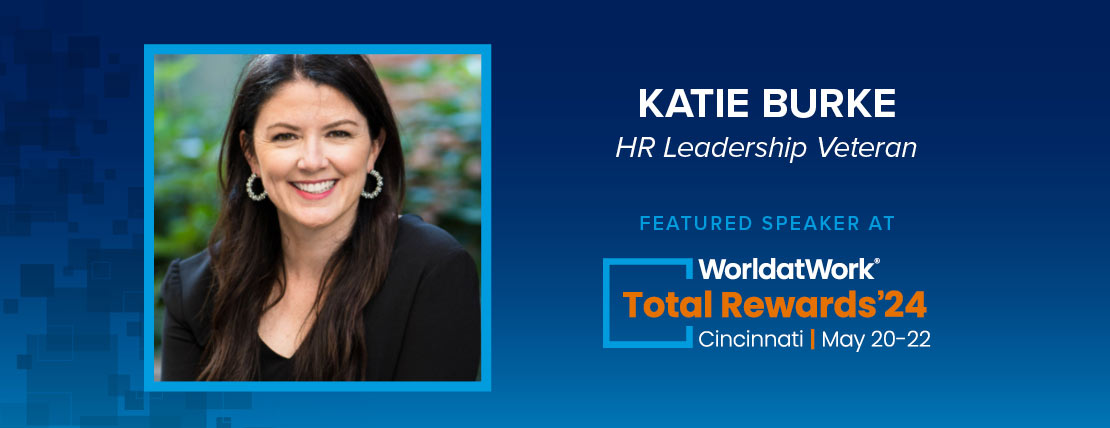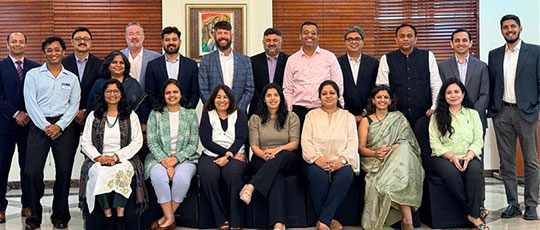- See and be seen. In connecting with the workforce, make the time to be visible and display empathy.
- Think and act like a marketer. Earn the organization’s attention through succinct, clear and compelling communications.
- Imperfections are expected. Workforce feedback can be tough to take, but embrace open conversation and share a continuous improvement spirit.
HR leadership veteran Katie Burke will appear in a panel discussion on the main stage at WorldatWork’s Total Rewards ’24 conference, coming up on May 20-22 in Cincinnati. Workspan Daily Editor Paul Arnold connected with Burke recently to talk about her career journey as well as the challenges and opportunities facing total rewards professionals.
Arnold: Some of the words that jump out from your professional profile are “innovation,” “leadership” and “inclusiveness.” Can you share why these words are so important to you and other total rewards (TR) professionals today?
Burke: I arrived at the HR party late. I started my career as a marketer, hence the innovation focus — I like working with teams to think about what’s possible and making it happen. On leadership, I was lucky to play college volleyball, and for me, it’s always been about the sum of the parts and being part of something bigger than yourself. I hope that shows up in my approach to all things “people.” And finally, inclusion is so important to creating workplaces that inspire people to do their best work. It’s one of the reasons I came into this profession.
Arnold: On May 21, you will share the main stage at Total Rewards ’24 for a panel discussion on “Optimizing Total Rewards in a Volatile World.” From your perspective, how have volatility, disruption and change impacted the total rewards function as well as the total rewards offering?
Burke: When there’s a lot of uncertainty in the world, employees look to leaders for certainty and clarity, so I hope one of the things we talk about is the importance of being really clear on what’s staying consistent and the very basics on how you’re looking out for people. In times of volatility, what’s hard for people to understand is that leaders often don’t have all the answers. But you have to resist the temptation to hide in your shell. Instead, make the time and space to be visible and be clear and empathetic with people. Then, on a more tactical note, I think the uncertainty has made many folks go back to the basics on what matters most and to deliver on it.
Arnold: Given the evolutionary (or even revolutionary) changes organizations have experienced over the past several years, what are some of the most important tools TR professionals need in order to thrive?
Burke: I’ll keep it simple here and just focus on one, which is proximity to the work. [Total rewards professionals] often rely on survey data or on feedback from senior leaders. Those are both very important inputs, and I believe in them. But in addition, I think the best people leaders shadow front-line employees, set up time to listen to what they are saying explicitly and what they are not, and to really understand the nature of what people at all levels are experiencing in their organization. Those who dig in, really listen and are willing to go a level deeper will win. I believe in that so much that I bought my leadership team at HubSpot headlamps and did a geology lesson to make it fun — going below the surface matters.
Arnold: You have worked in a variety of leadership roles — spanning culture and employee experience, marketing and brand management, and research and consulting. What’s been the biggest lesson you’ve learned about HR and leadership — particularly when it comes to total rewards — during those points in your professional journey?
Burke: I think a lesson very specific to total rewards is how personal it is for people in the organization. Total rewards is how they get paid, how their healthcare benefits show up during joyous and hard times for their family. It’s their first house, their first rent payment, their saving for an engagement ring or retirement. I think it’s super easy to get transaction [focused] in the TR space, and it’s really important that you understand compensation and benefits are incredibly personal to people and their families, and it’s important to remind yourself and your team of that regularly as you scale a people-focused team. Then I would say, from the marketing side of things, you absolutely have to earn people’s attention — even at work. Historically, company-wide communications have been incredibly jargon-filled and lengthy. Part of what I think all of us can learn from marketers is the push to be more succinct, clear and compelling vs. taking employee attention spans for granted.
Arnold: While serving as the chief people officer at HubSpot, your company earned a variety of “best place to work” awards. In your opinion, what is the secret sauce these days for an organization to be considered a best place to work in the eyes and hearts of its current and prospective workers?
Burke: I always say to teams and leaders that awards are the lagging indicator of a lot of hard work. You can’t be in it to win an award; you have to be in it to deserve the award. So, at HubSpot, we really focused on doing the work to ensure that what you read about our culture matched people’s experiences with our culture. That’s the real secret sauce. I think the other key was we never hid from tough feedback. Our employee survey data gets shared with all our employees. That can be very scary sometimes, but it meant we were never under the illusion we had things perfect. There were always things to fix and address, and people knew we took that very seriously.
Burke’s panel discussion is among the 120 learning sessions (featuring 200-plus speakers) taking place at the Total Rewards ’24 conference in Cincinnati. More than 2,000 industry professionals from around the U.S. and around the world are anticipated to attend. Click here to learn more and to register.
Editor’s Note: Additional Content
For more information and resources related to this article, see the pages below, which offer quick access to all WorldatWork content on these topics:








